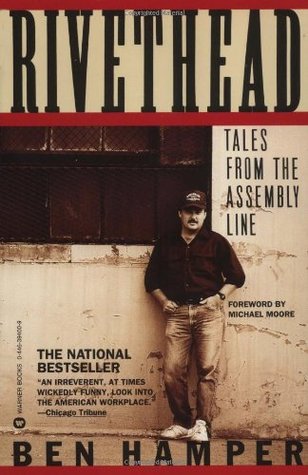Rivethead Tales from the Assembly Line- Non-fiction text #2

Rivethead follows the memories of Ben Harper and his experience with the assembly line for General Motors.
Ben Hamper’s spent ten years in the ‘70s and 80’s on a General Motors assembly line in Flint, Michigan as a “shop rat” like his careless father, grandfather, and great-grandfather.
Hamper told himself that he wouldn’t be an autoworker but soon after high school he got married and had a child, he needed a steady job and that’s what General Motors offered him.
Not only did Hamper work in the same place that his father did, but he also develops some of the same habits as well such as drugs, alcoholism, and slacking off at work.
At this assembly line Hamper thinks the work is boring, the bosses are stupid, and the workplace regulations are stupid and pointless. He thinks that all of it seems like a dead end. He doesn’t like the repetition of this job the most.
In the story, something that makes Ben keep going is that he made a lot of money and he pretty much did nothing for that money. He goes through his workdays because of the drugs and alcohol, and he doubles up on his really easy job with a partner of his so that they can alternate days working.
When he gets laid off of this job Jimmy Carter came up with a bonus program because of the unfair competition from the Japanese that ends up paying him more than when he was actually working.
This book is about a study of why the American industry had to be downsized. Hamper did not write the book because of this reason. He just wanted to show the GM was horrible and to make up feel the way he does.
This book to me was more about how Ben could get out of work and still get the money and mope around all day. Something that I wish this book would elaborate on is more information about the assembly line work and how the plant operated.
Something I really liked about the book is how it shows the worker’s point of view and showed the “shop life.”
Overall, I think that it was an interesting book to read and makes me want to ask questions about the industry. I would give Rivethead Tales from the Assembly Line 3 out 5 stars.
December 2nd, 2020 at 7:22 pm
I would say there was a bit more to Hamper than just wanting to criticize Chevy, but in general you’re not far off. Hamper is critical of assembly line work and how the workers have no say in what they do, or how they are treated by management. One of the things that has changed since this book is that automakers have given more autonomy to the workers. They’re seen as the experts (rather than management), and they can suggest changed in the operations.
This book didn’t influence those changes, but clearly Hamper wasn’t the only worker dissatisfied with how the Big Three treated line-workers.
You mention what I appreciated most about the book: the idea that working in the factory was generational. Sons followed their fathers into the factory for what was supposed to be a lifelong commitment. At one time that may have been true. But Hamper makes it clear that automakers were not committed to their workers.